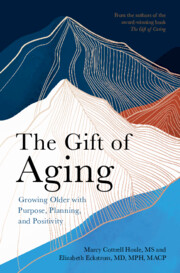Book contents
- The Gift of Aging
- Reviews
- Additional material
- The Gift of Aging
- Copyright page
- Dedication
- Contents
- Tables
- Contributors
- Foreword
- Introduction
- 1 Map and Compass
- Part I Caring For Your Mind
- 2 A Goal Higher than Joy
- 3 Why Does Having Purpose Matter?
- 4 An Open and Determined Mindset
- 5 Autonomy
- 6 Dance, Lucille, Dance
- 7 The Golden Spurtle
- 8 Is Retirement Bad for My Health and Well-Being?
- 9 Humanitude
- 10 106 Proof
- 11 Killing Us Quietly
- 12 Brain Health across the Lifespan
- Part II Caring For Your Body
- Part III Caring For Yourself and Your Family
- Part IV Caring For Your Soul
- Acknowledgments
- Appendix: Elizabeth’s Original Mediterranean Diet Recipes
- Index
12 - Brain Health across the Lifespan
What Can I Do NOW to Prevent Dementia Later On?
from Part I - Caring For Your Mind
Published online by Cambridge University Press: 08 June 2023
- The Gift of Aging
- Reviews
- Additional material
- The Gift of Aging
- Copyright page
- Dedication
- Contents
- Tables
- Contributors
- Foreword
- Introduction
- 1 Map and Compass
- Part I Caring For Your Mind
- 2 A Goal Higher than Joy
- 3 Why Does Having Purpose Matter?
- 4 An Open and Determined Mindset
- 5 Autonomy
- 6 Dance, Lucille, Dance
- 7 The Golden Spurtle
- 8 Is Retirement Bad for My Health and Well-Being?
- 9 Humanitude
- 10 106 Proof
- 11 Killing Us Quietly
- 12 Brain Health across the Lifespan
- Part II Caring For Your Body
- Part III Caring For Yourself and Your Family
- Part IV Caring For Your Soul
- Acknowledgments
- Appendix: Elizabeth’s Original Mediterranean Diet Recipes
- Index
Summary
Throughout our lives, our brains undergo a process of gradual, ongoing, and highly variable modifications. It is perfectly normal for people to notice slight cognitive changes by their 50s. This chapter explains how our brain changes throughout our life span. New research on dementia has good news. Just like incidence of heart disease is going down, the incidence of dementia going down! Prevalence, however, or total number of cases, is going up, because there are more older adults in the population than ever before. Research shows life-long healthy habits may cut dementia risk by at least 1/3. Employing healthy habits at age 50 reduces our risk for dementia for at least 24 years. People in Blue Zones develop dementia at a 75% lower rate. Chapter explains the top ten practices to keep brain healthy and high functioning throughout life. Pushing yourself to learn something new helps you develop new neurons and new neural connections. Actions to take explained: Exercise, Mediterranean Diet, participate in Cognitive Training/Stimulation. Engage in creative pursuits. Sleep. Be mindful of medications. Higher education. Wear hearing aids. Watch heath. Avoid social isolation. Celebrate a healthy aging brain.
Keywords
- Type
- Chapter
- Information
- The Gift of AgingGrowing Older with Purpose, Planning and Positivity, pp. 74 - 84Publisher: Cambridge University PressPrint publication year: 2023



